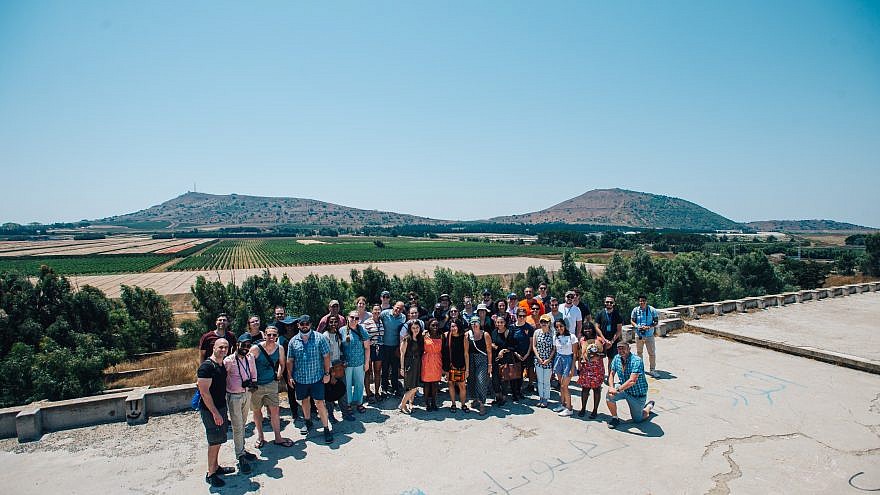A group of 42 legal, international relations and military leaders from around the world met with Israeli military officials and politicians this month to participate in workshops and sessions focusing on Israel’s foreign and domestic policies.
The strategic tour, organized by American-based nonprofit Our Soldiers Speak (OSS), was designed to expose the group to the unique challenges Israel faces on a daily basis. Dedicated to changing international narratives on Israel, the OSS delegation traveled around the country from Aug. 11-21 on a mission called “Israel, Law & Policy Lens (I-LAP).”
Participants hailed from countries from all over the world and included officers from the U.S. Special Forces, military intelligence and Coast Guard; congressional staffers; senate legal clerks; commanders from the Swiss Armed Forces; a lecturer from the International Criminal Tribunal for Rwanda; a legal adviser to the International Committee of the Red Cross; and an advocate to the High Court of Tanzania.
With workshops and sessions focused on Israel’s foreign and domestic policies, the group met with leaders from several key sectors, including government, judiciary, security, military, cyber-security, politics, policy and high-tech. They visited centers of coexistence between Jews and Arabs and were briefed on the Palestinian Authority and Hamas, as well as on terrorist activity in general and the past year’s Gaza border riots.
“Our goal is to use the I-LAP tour to showcase the unique policy and strategic issues that our country, soldiers, security and police officers face on a daily basis,” said OSS founder and CEO Benjamin Anthony.
“What we want to do is provide the gold standard of substantive programming from the mainstream Israeli perspective—left, center and right—to individuals likely to affect the public space in the near future,” he told JNS. “Through their experience on this trip, our hope is to marshal their support as ambassadors of goodwill for Israel in the countries they live and the governments they serve,” said Anthony.
The organization has succeeded in achieving this goal, he added, even when delegates begin with no opinion or even a negative opinion on Israel.
Previously, said Anthony, “one of our delegates from Kenya wrote his master’s [thesis] about Israel’s security barrier and illegitimacy of the state based on that. But after the program, he said he’d spend his life’s work righting his wrong.”
Kenyan law graduate Eurallyah Akinyi acknowledged that while she knew “close to zero about Israel in terms of its law and policy” before visiting, the trip offered her “immense exposure.”
She reported learning that “there is a big difference between what the media propagates and the reality on the ground” and “how a tiny country developed from close to nothing to become a top player in high-tech and military intelligence.”
She also told JNS that “the media paints Israel in the negative [sense], and I recognize that reality is a totally different thing altogether.”
Akinyi said that Israelis urged her to “always keep your identity, stay firm and believe in yourself,” and that she hopes to return to Kenya using her new perspective and knowledge to improve her litigation skills, and by proxy, the Kenyan judiciary system.
Aiming for robust and informed discussion
Nadine Alkiswany, a third-year law student at the South Texas College of Law, said that the trip affected her on a “profound personal, religious and professional level.”
“As a Palestinian American from rural America,” she told JNS, “I was aware of the rhetoric [about Israel in the media] before I came, but now that I’ve experienced this trip, I feel better equipped to spot the rhetoric and to bring a more well-rounded discussion to my community.”
While noting that she has “always been sympathetic to the Jewish plight as an American because I was taught about the Holocaust,” Alkiswany said that her “perspective of Zionism has developed significantly.”
She went on to say, “I believe this tour will impact my work in the future for the better—to bring a more robust and informed discussion to the table about the religious, demographic and political controversies that cannot be divorced from the geography. I only hope that it will impact my work to build a better understanding of humanity and the pressing importance of diversity, understanding and respect for our neighbors.”
As former president of Northeastern University School of Law’s “Alliance for Israel” club, Micah Jones, lawyer at an international law firm, came to the I-LAP tour with a good amount of knowledge about Israel. Identifying as a “secular Zionist,” Jones spent a year in Afghanistan, serving as an officer in the U.S. Army.
Though he had much theoretical knowledge about Israel, he told JNS, the trip made him internalize the geopolitical reality Israel faces—“how close and dense everything is,” with “intertwined Arab and Jewish neighborhoods”—knowledge he said will help him to “approach future conversations emphasizing depth and nuance.”
Jones also maintained that a visit to an industrial park near the border with Jordan highlighted Israel’s “new investment in economic development with Palestinians and neighboring Arab states,” offering hope to the region, with Israel demonstrating to its neighbors that “we are not leaving the area and can bring a respected partnership.”
At their closing session, Anthony voiced his confidence to the delegates that “the conclusion of our tour is the beginning of your involvement in Israel.”
He invited the delegates to continue their involvement by adding their expertise and writing position papers, to be published and disseminated through the Miriam Institute, Benjamin’s new policy-action tank that aims to bring Israel’s perspective to the global discourse.


























